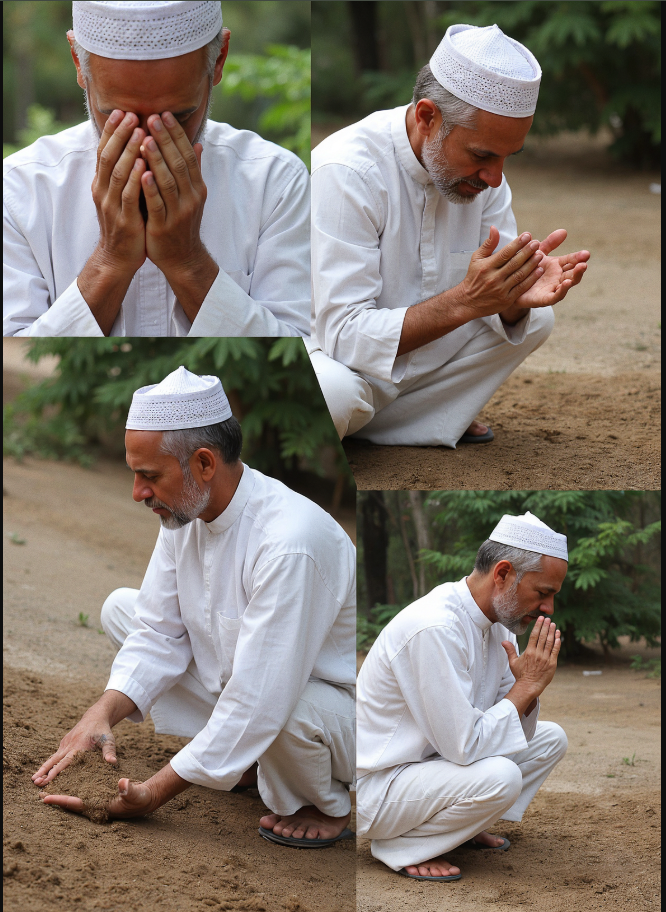
Steps to Perform Tayammum Correctly
Tayammum is a dry ablution in Islam that acts as an alternative to Wudu when water is not available. To perform Tayammum correctly, you should know the proper guidance and step-by-step procedure. First, strike both hands gently on clean ground or earth that is not too tacky or wet. Then, wipe your face with your hands. After this, strike the ground a second time and wipe your right arm, including the inner side up to the cartilage of the upper ears, then repeat with your left arm. These guidelines ensure Tayammum is done properly during times when water cannot be used, fulfilling the requirements of purification as taught in Islam.
Importance of Tayammum in Islam
In Islam, Tayammum is a special way for Muslims to stay neat, clean, and pure when there is no access to water for wudu or ghusl. The Quran and the teachings of the Holy Prophet Muhammad, peace be upon him, guide believers to use dry ablution to maintain ritual purity. This method is an exercise in making worship easier during difficult situations or challenging circumstances, showing Allah’s mercy, kindness, and compassion. Tayammum allows Muslims to continue their prayers and religious duties even when water is not available, helping them keep their spiritual connection strong.
The practice of Tayammum involves using clean soil or earth to purify the hands and face, fulfilling the commands in Surah an Nisa, 4:43, where Allah instructs believers about situations when water cannot be used—such as when one is ill, on a journey, or has contacted women. It emphasizes the importance of using clean earth to wipe faces and hands as a sign of faith and obedience. Indeed, Allah is most merciful and forgiving, and the Sahih Bukhari (348) records that the Prophet advised to perform Tayammum when there is not enough water. This shows that The Rights of Quran upon Muslims include following such guidance to maintain purity and continue worship without hardship.
Performing Wudu Without Water: Using Tayammum
When there is no access to water available, Muslims have the option to perform Tayammum, which is a dry ablution and an important part of Islamic laws. The Arabic word Tayammum means to wipe the person’s face and hands with clean soil, purified sand, or dust. The purpose and aim of Tayammum is to purify oneself for prayer when water is not an option. This method is derived from Islamic teachings to allow a person to continue their worship and repair their spiritual connection when there is no access to water; in such cases, one should go for Tayammum as the proper alternative.
Is Tayammum Allowed When You Have a Fever?
If a sick person with a fever fears harm or any bad result from using water, then it is permissible for them to do Tayammum, which is dry ablution. No one should force themselves to get water if they are unable or scared they may suffer harm. When water is available but a person is not able or too weak to use it without risk, doing Tayammum is the correct and right choice to maintain purity before prayer.
Hadith For Dry Ablution
The Prophet Muhammad, peace be upon him, said that if you do not find water for purification, use clean earth as the source of purification. Even if water is not found for ten years, it is better to cleanse yourself this way than not at all.
Quranic Verses on Dry Ablution
In Surah Al-Ma’idah, 5:6, Allah, SWT, commands believers to purify yourselves before you stand for prayer by washing the face, hands, up to the elbows, wipe heads, and wash the feet up to the ankles. But if you are ill, on a journey, relieving himself, or have contacted women and do not find water, then you should seek clean earth to wipe faces and wipe hands with the intent to purify. This teaching shows Allah’s complete favor and asks the grateful to follow these difficult but merciful guidelines.
Tayammum Duas
Dua for Intention of Tayammum (Niyyah)
اللَّهُمَّ إِنِّي نَوَيْتُ التَّيَمُّمَ لِتَطْهِيرِ بَدَنِي مِنَ الْحَدَثِ لِأَدَاءِ فَرَائِضِكَ، فَتَقَبَّلْهُ مِنِّي.
O Allah, I hope to perform tayammum or dry ablution to purify my body from impurity to fulfill Your responsibility. Accept it from me.
Dua for Intention of Tayammum (Niyyah)
بِسْمِ اللَّهِ، اللَّهُمَّ طَهِّرْ قَلْبِي وَزَكِّ نَفْسِي.
In the name of Allah. O Allah, purify my heart and purify my soul.
Dua after Completing Dry Ablution
اللَّهُمَّ اجْعَلْنِي مِنَ التَّوَّابِينَ وَاجْعَلْنِي مِنَ الْمُتَطَهِّرِينَ.
O Allah, make me among those who are shamed and those who purify themselves.
This dua can help appreciate focus and awareness during Dry Ablution.
Final Thoughts on Tayammum
Tayammum, or dry ablution, helps Muslims to stay clean and continue to pray and perform their religious duties even when there is a lack of water. This practice is a sign of mercy and convenience from Allah, as it is mentioned in the holy Quran and follows the sunnah. When doing Tayammum, one makes sure to blow into hands if using dirt, and avoid making the face dusty or dirty, thus properly allowing a person to purify oneself and maintain their worship.
